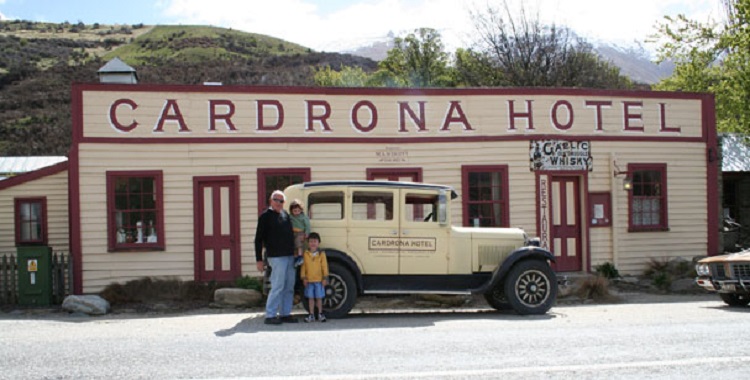6 helpful ways for the ‘elder’ travel generation to seize the opportunities to re-explore their travelling ways
One aspect of the credit crunch and the financial crises that have exploded around the world is the increased availability of free time to a huge swathe of educated workers either made redundant or placed on sabbatical.
Time to visit the grandchildren abroad?
At one time these hard working members of society would have eschewed long term holidays, instead working more and focusing their attentions on career development. In the United States even taking the full compliment of allotted vacation time was frowned upon in a peer pressure environment.
All this has changed and a new paradigm has emerged, a six month paid severance is not uncommon for many professionals and once the trauma of unemployment has subsided many turn their thoughts to travel and fulfilling their once suppressed dreams of escaping the rat race and seeing the world.
There are two issues that confront them at this point; the first is deciding where to go and how to engage themselves in a constructive manner, and the second problem is one of a more practical nature and that is fear of the unknown. Budget travel may have played a part for them many years ago but now they are used to swanky hotels and paid business travel, changing their attitudes to accommodate new financial circumstances can prove to be a big difficulty.
So what tips and advice do these new world travellers need? Do they require handholding and guidance or just a prod in the general direction? I believe there is a great diversity of needs in this area and a simple one size fits all solution is impractical. What is more beneficial is a kind of travel toolbox where practical issues can be discussed, options reviewed and advice offered.
There are many adventures that can now be tried in some beautiful locations worldwide
For some travellers the options are well documented and pretty straightforward. Most Australian companies are well versed in the fact that their employees take time off to travel and a huge peer supported network exists to facilitate work permits, visas and the like. Equally European gap year students are almost overwhelmed nowadays with guidebooks and travel related information. For older travellers suddenly becoming part of the travel scene can be daunting, what is needed for them are social networking tools, budget travel guidebooks, hostel reviews and low cost airlines.
So to get started let’s look at a selection of tools and ideas that can help kick start the travel plans of our new generation.
- Where to go?
A round the world trip is quite often touted as the must do itinerary, however this is limiting in both direction and duration. Another idea is to choose a continent, mostly a seasonal decision, and start there. Take South East Asia for example, with a visa in hand it is possible to take a one way ticket into Bangkok and plan an trip that encompasses Thailand, Cambodia, and Vietnam allowing the traveller much greater flexibility.
2 How to travel?
Slowly, would be my advice. After years in the corporate hothouse many new adventurers will be anxious to rush around and try to see as much as possible. The better strategy, in my opinion, is to relax and let time run at its own pace. I recall working in Fiji as a recreation manager in a four star hotel, the guests would arrive for a mangrove tour that was scheduled to start at 9am (Fiji time) and would start to get agitated when it was inevitably delayed. It would sometimes take a week for them to acclimatise and go with the flow.
Take time to travel some of those places you’ve always dreamed of
Take buses and trains; mix with the locals to experience the sounds and smells of the environment that surrounds you and to get a real feel of the way of life.
- What to take?
Even the most veteran of travellers is prone to taking more stuff than they actually need; the maxim is the larger the backpack the more you will take, so get a smaller pack! Forget about the kitchen sink and make do with a few easily washable clothes and, where necessary, buy items that you really need on the road as you travel. Good quality lightweight travel will make you more mobile and flexible saving money on expenses such as excess baggage charges.
- Where to stay?
Gone are the days of loyalty points and swanky hotels, guesthouses and hostels are fine alternatives. They act as points of reference where you can meet fellow travellers and gather information for the route ahead as well as offering a safe environment in which to wind down after a long trip. You will probably be sharing a room with a younger mixed crowd but that shouldn’t put you off, a shared interest and common goal of discovery is enough to bridge age and gender gaps and makes for interesting and stimulation conversation over a cold beer in the evening.
- Keeping in touch
Camping, Tramping, Hiking or Hotels….do what you dreamed of doing
Corporate e-mail and a blackberry glued to the side of your head may have been all well and good in a previous life, but pay-as- you- go phones, Skype and Facebook are more likely to be of use now. A desktop computer needs to be replaced by a Netbook; light and small enough to stow in a backpack this will be invaluable as a travel tool, a source of entertainment, a mobile office for sending out those resumes and, with abundant free wifi in many hostels, a communications centre.
- More Information
Reading travel blogs is a good start; these can give you ideas and nuggets of information that may have been overlooked by the tradition guide books. Forums can be a great resource as well with many seasoned travellers adding their comments and advice on everything from local customs to great alternative accommodations.
Have you recently lost your job and decided to travel?
What have been the problems and questions you have encountered in your travel planning and how have you adapted to a new pace of life?
 BESTCITYTRIPS
BESTCITYTRIPS




